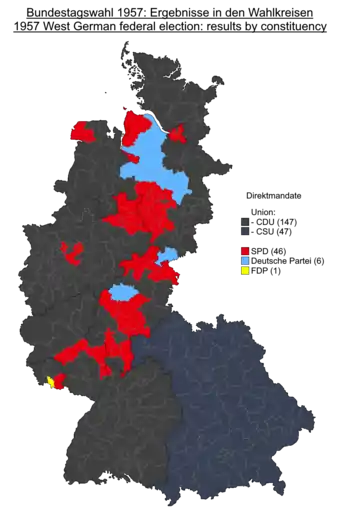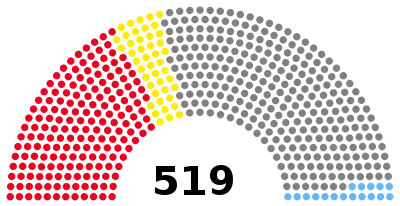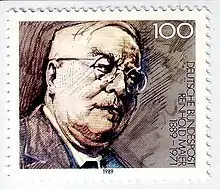1957 West German federal election
Federal elections were held in West Germany on 15 September 1957 to elect the third Bundestag. The Christian Democratic Union and its longtime ally, the Christian Social Union in Bavaria, won a sweeping victory, taking 277 seats in the Bundestag to win the first — and to date, only — absolute majority for a single German parliamentary group in a free election.
| ||||||||||||||||||||||||||||||||||||||||||||||||||||||||||||||||||||||||||||||||||
All 519 seats in the Bundestag 260 seats needed for a majority | ||||||||||||||||||||||||||||||||||||||||||||||||||||||||||||||||||||||||||||||||||
|---|---|---|---|---|---|---|---|---|---|---|---|---|---|---|---|---|---|---|---|---|---|---|---|---|---|---|---|---|---|---|---|---|---|---|---|---|---|---|---|---|---|---|---|---|---|---|---|---|---|---|---|---|---|---|---|---|---|---|---|---|---|---|---|---|---|---|---|---|---|---|---|---|---|---|---|---|---|---|---|---|---|---|
| Registered | 35,400,923 | |||||||||||||||||||||||||||||||||||||||||||||||||||||||||||||||||||||||||||||||||
| Turnout | 31,072,894 (87.8%)[2] | |||||||||||||||||||||||||||||||||||||||||||||||||||||||||||||||||||||||||||||||||
| ||||||||||||||||||||||||||||||||||||||||||||||||||||||||||||||||||||||||||||||||||
 Results by constituency for the first votes. Grey denotes seats won by the CDU/CSU; red denotes seats won by the SPD; light blue denotes seats won by the German Party; yellow denotes the seat won by the FDP. | ||||||||||||||||||||||||||||||||||||||||||||||||||||||||||||||||||||||||||||||||||
| ||||||||||||||||||||||||||||||||||||||||||||||||||||||||||||||||||||||||||||||||||
Campaign
Federal Chancellor Adenauer had some solid advantages over his Social Democratic opponent, Erich Ollenhauer; West Germany had become fully sovereign in 1955 and had joined the European Economic Community in March 1957. Its economy was growing steadily with very low unemployment, and most West Germans felt more prosperous and more secure than in 1949 or 1953. Although the West German economic growth was more directly enhanced by the social market economy policies of Economics Minister Ludwig Erhard, many West German voters gave Adenauer the credit for it.[3][4]
Results
The All-German Bloc lost all of their seats, but the ideologically-similar German Party maintained theirs. It was the last time in the 20th century that a party to the right of the CDU/CSU Union gained seats in the Bundestag.
 | ||||||||||||||||
| Parties | Constituency | Party list | Total seats | |||||||||||||
|---|---|---|---|---|---|---|---|---|---|---|---|---|---|---|---|---|
| Votes | % | +/− | Seats | +/− | Votes | % | +/− | Seats | +/− | Seats† | +/− | % | ||||
| Christian Democratic Union (CDU) | 11,975,400 | 39.7 | +4.9 | 147 | +17 | 11,875,339 | 39.7 | +3.3 | 68 | +7 | 222 | +25 | 42.8 | |||
| Social Democratic Party (SPD) | 9,651,669 | 32.0 | +2.5 | 46 | +1 | 9,495,571 | 31.8 | +3.0 | 123 | +17 | 181 | +19 | 34.9 | |||
| Christian Social Union (CSU) | 3,186,150 | 10.6 | +1.7 | 47 | +5 | 3,133,060 | 10.5 | +1.7 | 8 | −2 | 55 | +3 | 10.6 | |||
| Free Democratic Party (FDP) | 2,276,234 | 7.5 | −3.3 | 1 | −13 | 2,307,135 | 7.7 | −1.8 | 40 | +6 | 44 | −9 | 8.5 | |||
| All-German Bloc/League of Expellees and Deprived of Rights (GB/BHE) | 1,324,636 | 4.4 | −1.5 | 0 | ±0 | 1,374,066 | 4.6 | −1.3 | 0 | −27 | 0 | −27 | 0 | |||
| German Party (DP) | 1,062,293 | 3.5 | −0.4 | 6 | −4 | 1,007,282 | 3.4 | +0.1 | 11 | +6 | 17 | +2 | 3.3 | |||
| German Reich Party (DRP) | 290,622 | 1.0 | +0.3 | 0 | ±0 | 308,564 | 1.0 | −0.1 | 0 | ±0 | 0 | ±0 | 0 | |||
| Federalist Union (FU) | 295,533 | 1.0 | +1.0 | 0 | ±0 | 254,322 | 0.9 | +0.9 | 0 | ±0 | 0 | ±0 | 0 | |||
| Alliance of Germans (BdD) | 37,329 | 0.1 | +0.1 | 0 | ±0 | 58,725 | 0.2 | +0.2 | 0 | ±0 | 0 | ±0 | 0 | |||
| South Schleswig Voter Federation (SSW) | 33,463 | 0.1 | −0.1 | 0 | ±0 | 32,262 | 0.1 | −0.1 | 0 | ±0 | 0 | ±0 | 0 | |||
| German Community (DG) | 16,410 | 0.1 | +0.1 | 0 | ±0 | 17,490 | 0.1 | +0.1 | 0 | ±0 | 0 | ±0 | 0 | |||
| German Middle Class (Mittelstand) | 3,024 | 0.0 | +0.0 | 0 | ±0 | 36,592 | 0.1 | +0.1 | 0 | ±0 | 0 | ±0 | 0 | |||
| Patriotic Union (VU) | 2,250 | 0.0 | ±0.0 | 0 | ±0 | 5,020 | 0.0 | +0.0 | 0 | ±0 | 0 | ±0 | 0 | |||
| Party of the Good Germans (PdgD) | 356 | 0.0 | +0.0 | 0 | ±0 | – | – | – | – | – | 0 | ±0 | 0 | |||
| Electoral groups and independents | 845 | 0.0 | −0.1 | 0 | ±0 | – | – | – | – | – | 0 | ±0 | 0 | |||
| Invalid/blank votes | 916,680 | — | — | — | — | 1,167,466 | — | — | — | — | — | — | — | |||
| Total | 31,072,894 | 100 | ±0.0 | 247 | +5 | 31,072,894 | 100 | ±0.0 | 250 | +5 | 519 | +10 | ±0 | |||
| Registered voters/turnout | 35,400,923 | 87.8 | — | — | — | 35,400,923 | 87.8 | — | — | — | — | — | — | |||
| Source: Federal Returning Officer | ||||||||||||||||
- ^† — includes the non-voting delegates for West Berlin (12 SPD, 7 CDU, 3 FDP).
| 277 | 17 | 181 | 43 |
| CDU/CSU | DP | SPD | FDP |
Aftermath
Konrad Adenauer led the CDU-CSU coalition to a landslide victory. The CDU-CSU won an outright majority—to date, the only time a German party has been elected to a majority government in a free election (the CDU and CSU sit as a single bloc in the Bundestag).
References
- "Wahl zum 3. Deutschen Bundestag am 15. September 1957" (in German). Bundeswahlleiter. Archived from the original on 6 May 2012. Retrieved 6 May 2012.
- "Voter turnout by election year". Website of the Federal Returning Officer's Office. The Federal Returning Officer. Archived from the original on 7 November 2014. Retrieved 7 November 2014.
- Erling Bjöl, Grimberg's History of the Nations, volume 23: The Rich West, "A Giant Dwarf: West Germany," Helsinki: WSOY, 1985
- Dennis L. Bark and David R. Gress, A History of West Germany, volume 1: 1945–1963: From Shadow to Substance, London, UK: Basil Blackwell, 1989
.jpg.webp)

